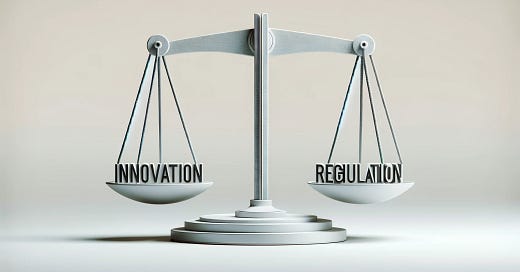AI Washing: The Balancing Act Between Innovation and Regulation
As artificial intelligence reshapes industries, the deceptive practice of ‘AI washing’—akin to ‘greenwashing’—is emerging as a major concern among tech experts and regulators. This practice involves companies exaggerating or fabricating their AI capabilities, prompting scrutiny from both the Securities and Exchange Commission (SEC) and the Federal Trade Commission (FTC). Such actions underline the critical need for transparency and accuracy in AI-related claims.
Clear and honest reporting is essential, yet it requires a delicate balance. While regulatory measures are crucial for preventing misleading claims and protecting stakeholders, overly stringent regulations could stifle innovation, especially in a field as nascent and rapidly evolving as AI. The early days of the space race provide a pertinent historical parallel. Just as premature and overly detailed regulations could have curtailed the innovative leaps made in space exploration, too heavy a hand in governing AI’s early development could slow progress at a time when momentum is vital.
The challenge is to create regulations that ensure transparency and accountability without stifling innovation that drives technological advancement. To this end, regulatory bodies like the SEC could consider flexible frameworks that adapt over time, incorporating industry input and evolving as the technology itself does. A relevant example from the fintech sector involves ‘regulatory sandboxes,’ which allow startups to test innovative financial products within a controlled regulatory framework. This approach, pioneered by the UK’s Financial Conduct Authority, has proven effective in balancing the need for robust oversight with the imperative to foster innovation.
Furthermore, industry conferences such as HumanX are crucial. They serve as vital platforms where technologists, regulators, and ethicists come together to discuss and define best practices and develop new oversight models tailored to the unique challenges of AI.
To navigate this complex terrain, companies should proactively engage with these developing standards and participate in shaping the conversation. By collaborating on universal benchmarks for AI claims and supporting the development of independent verification tools—similar to initiatives in other industries—businesses can help ensure that innovation and integrity go hand in hand.
As we stand on the cusp of AI’s potential, let us commit to a path that neither hinders technological breakthroughs nor compromises on the ethical standards that must underpin such advancements. A balanced, thoughtful approach to AI regulation will serve not only to protect consumers and investors but also to foster an ecosystem in which genuine innovation can flourish.




